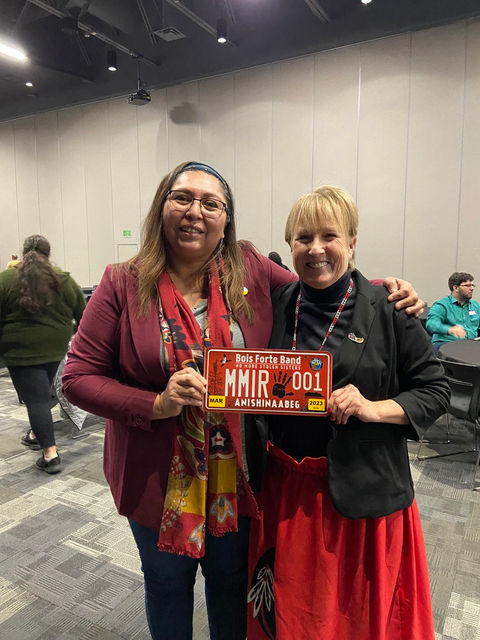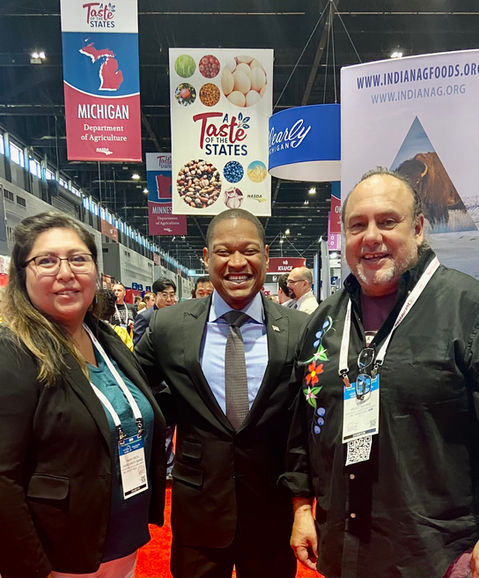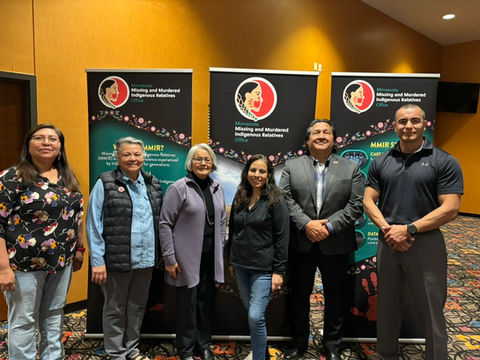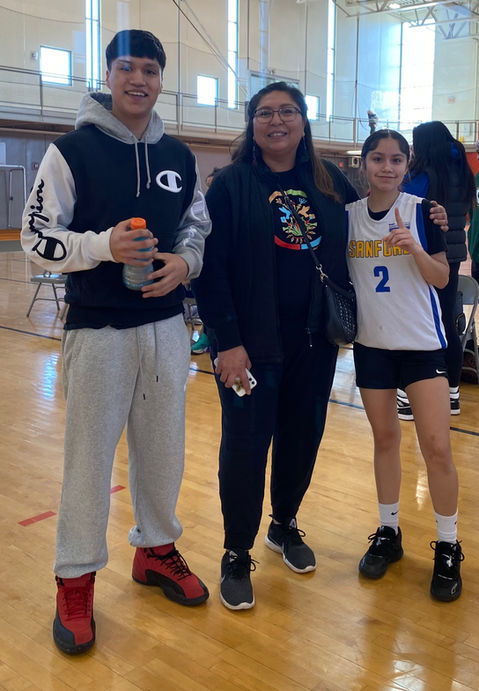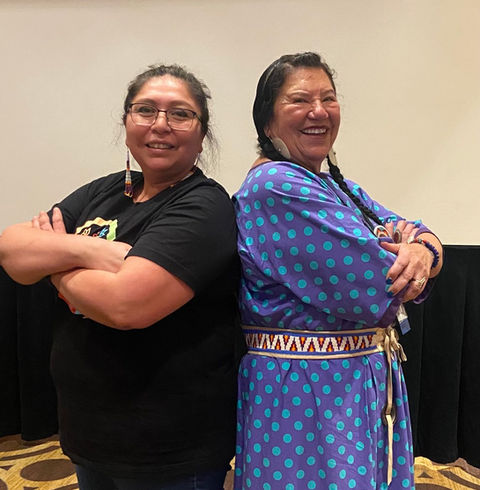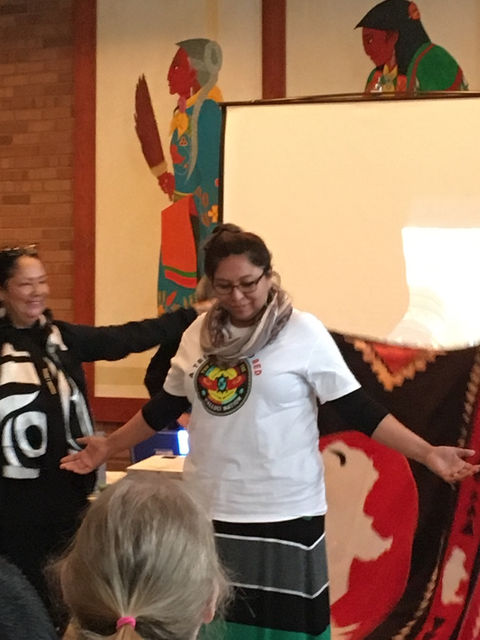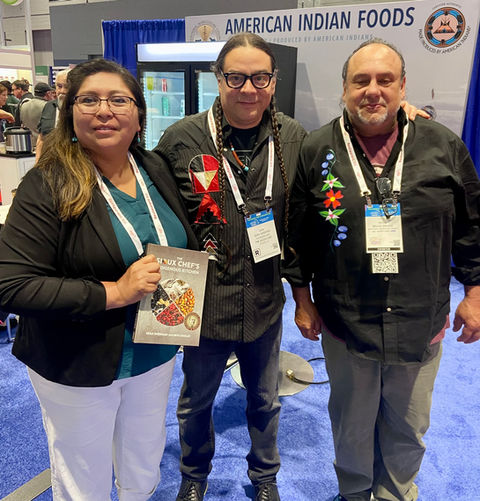
About
Born in northern Nevada and a member of the Pyramid Lake Paiute Tribe, Tawny is grounded in her upbringing as Numu/Newe (Paiute/Shoshone). Together, she and her mother were first-generation college graduates and attended the University of Nevada, Reno. She received her bachelor’s degree in social work and was later recruited to the McNair Scholar program. Then, she decided to stay in Minnesota to attend graduate school. In 1999, she received her MSW, married Bruce Savage, and raised their children on the Fond du Lac Reservation, where they live today. Tawny is a seasoned clinical social worker passionate about driving social change. As a mother, grandmother, aunt, and sister, she brings boundless energy to fostering positive transformation. Tawny's unwavering commitment to tribal communities shines through her extensive experience as a therapist and coordinator. Her leadership philosophy centers on systems response and stabilizing people in crisis. She focuses on supporting youth and families and is excited about continuing momentum for future generations. Challenges may arise, but Tawny leverages her wealth of experience and broad vision to tackle them head-on.
Get To Know Me
Tawny’s journey is that of a resilient survivor. A strong line of women raised her: her mother, grandmother, and aunt. Growing up in poverty and with a single mother, it was important for Tawny to find her path in life, and she always sought answers through education and culture. Growing up in Nevada, she was a part of the Sage Spirit Dance group, and her family was very involved in community organizing through powwows, prevention activities, and youth programming. In college, she was involved with the UNR Native American Student Association, shared great moments with fellow social work students, and enjoyed advocating for students with disabilities. Her uncle’s advocacy work influenced this as a person in recovery. The collective strength within the family was expressed through art and culture. They all served as role models for the work Tawny would go on to do in her life's work. The advocacy she learned early in life has brought her to work within the Missing and Murdered Indigenous Relatives movement. As a helper over the years, she understands the underlying risk factors that lead to an Indigenous person going missing. She uses her clinical assessment skills to support people but, most importantly, uses her voice to assert social change in system response. She relies on the communities and families to be the best advocates and have the solutions to the struggles. As a servant leader, she is a good listener and coordinates resources to meet the needs best and fill gaps for services. Tawny’s life experience and early upbringing gave her informed approaches and expertise. She is self-aware and a consistent voice for social justice.


The Story
In 2023, Tawny and her sister visited the Stewart Indian School Cultural Center and Museum in Carson City, Nevada. Together, the sisters paged through historical documents and found the names of relatives who had attended the boarding school. Growing up, they never heard about the government policies and practices that supported the genocide of the Indigenous people of the Great Basin. The lives of relatives who attended boarding school were changed in significant ways. The loss of language, culture, and connection to the land were examples of the impact. As she stood outside one of the original buildings built by masonry students with rocks quarried from mines, Tawny had mixed emotions. The legacy that the campus started from genocidal government policies is clear. Yet, the museum sought to educate and memorialize the history of students' experiences and those advocating for school changes. You can see the sports fields where students play and know that nearby parents would camp to try to be close to their children. It is there that the sagebrush grows, and the wind comes down from the mountains to ignite the memory that resides. For Tawny, the intricate beauty and artistry in the masonry is a reminder of the talent, brilliance, and pride that resonates in every survivor who has lived experience to be shared so that we never forget and inform our work for the next generation.

Professional Involvement
Education
.png)
Masters of Social Work, MSW, LICSW #16747
University of Minnesota Twin Cities, School of Social Work St. Paul, MN
August 2000
.jpg)
Bachelor of Arts, BA
University of Nevada, Reno, School of Social Work Reno, NV
June 1997
.png)
Chemical Dependency Certificate, LADC #302226
Fond du Lac Community College, Cloquet, MN
June 2007
Work Experience

St. Paul
.jpg)
Cloquet, MN
.jpg)
Duluth, MN
.jpg)
Cloquet, MN
.jpg)
Cloquet, MN
.jpg)
Sawyer, MN
.png)
Cass Lake, MN
Violence Prevention Coordinator - Office of Justice Programs of the Minnesota Department of Public Safety
February 2023- Present
Social Services Coordinator - Fond du Lac Human Services
March 2019 - February 2023
Mental Health Therapist - White Earth Mental Health
September 2014- January 2019
Mental Health Therapist - Fond du Lac Human Services
June 2011 - September 2014
Alcohol and Drug Counselor - Fond du Lac Human Services
January 2008 - June 2011
Family Counselor - Minnesota Indian Primary Residential Treatment Center
July 2002 - January 2008
Employment Services Coordinator - The Minnesota Chippewa Tribe Employment Services Program
September 2000 - June 2002
Leadership Experiences, Honors, and Awards
2024 / MMIR Training for Tribal Advocates and Tribal Emergency Managers
Office of Justice Programs of the Department of Public Safety
2024 / Grow Local Food Fund Grant Recipient
Duluth Whole Foods Co-Op
2023 / DPS Honorable Mention for Promoter of Diversity, Equity, and Inclusion of Excellence Award
Minnesota Department of Public Safety
2021 / Pinwheel for Prevention Award
Fond du Lac Human Services - Social Services Program
2015 - 2019 / Fond du Lac Tribal & Community College-Adjunct Instructor
HSER 1001 Intro to Human Services 3 credits-1 semester in 2015
PSYC 1030 Drug Use and Abuse 3 credits-1 semester 2018
CDEP 2030 Co-occurring Disorders 4 credits-2 semesters 2018 & 2019
2018/ Phenomenal Award Recipient
American Indian Community Housing Organization (AICHO)







